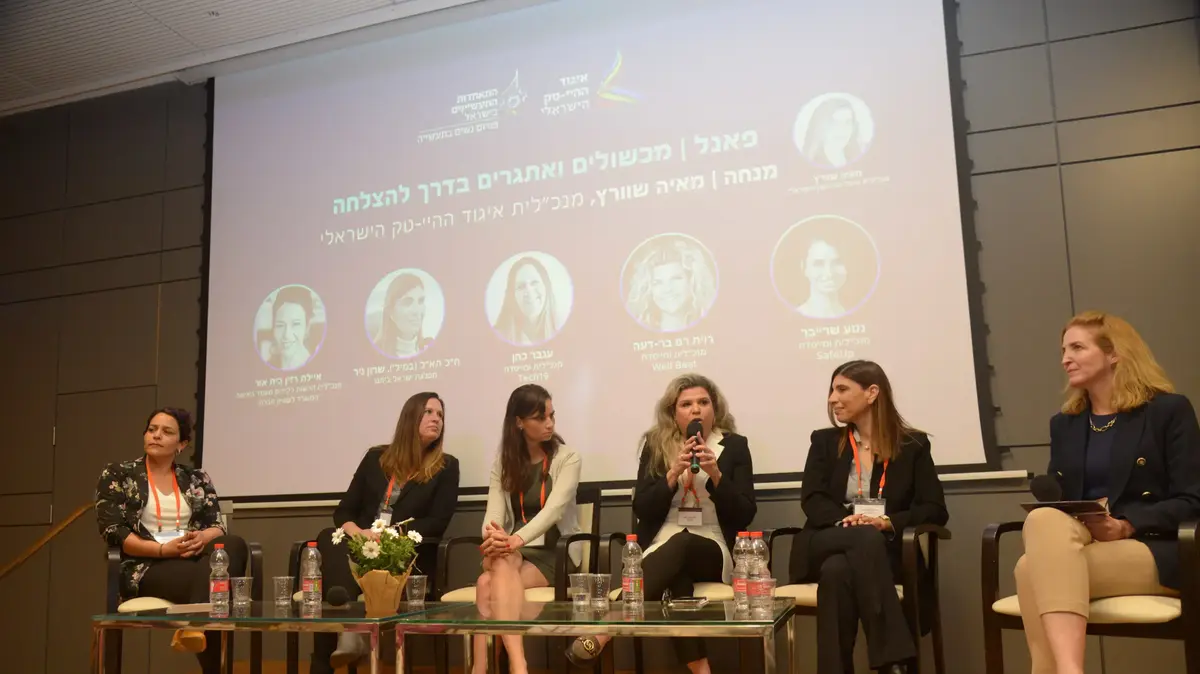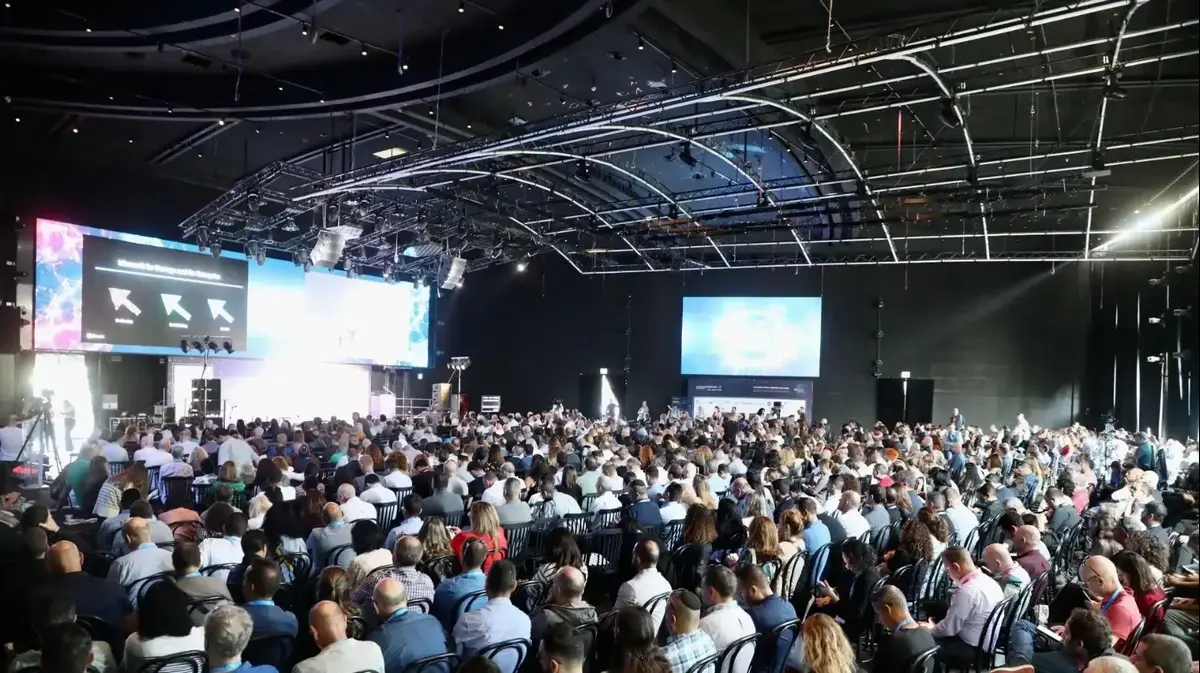King of the Israeli high-tech and Amazon war: The week was high-tech
How American Funds Become Controlled by Israeli High-Tech, Mattress Company Casper Provides Lesson to Venture Capital Investors and Why Investors in the Hi-Bob Startup Don't Attend Sexual Harassment Exposed to What Happened to High Tech This Week
At the end of October, the Insight Partners Fund held an event at Jaffa on the Sea in Jaffa attended by some 150 high-tech people, mainly entrepreneurs and venture capitalists. As usual, the venue hosts weddings, but on the same day the groom of joy was investor Jeff Horing, the founder of the fund, and who has been behind some of the most prominent and intriguing deals in Israeli high-tech for the past two years. Apart from good food and a performance by Neta Barzilai, there was also a small improvised ceremony in which a paper crown was awarded to Avishay Avrahami and Roy Man, who head Wix and Monday (respectively), two companies in which Insight invested. Awarding the crown was a joke, but its significance is clear - Horing is gradually becoming the undisputed king of the high-tech industry in Israel.
Some may disagree with this assertion, may think it is exaggerated, but anyone who follows the local startup industry is clear that Insight's moves in Israel - character, structure and size of transactions - are not trivial and to a large extent are changing the face of the industry. Partial List: Acquisition of Cyber Armis Control at $ 1.1 Billion, Closed Last Week; Purchase of Genesis Fund's membership portfolio for hundreds of millions of dollars; And holdings in unicorns (private companies that received over $ 1 billion worth) such as JFrog, Citizens, Litrix and Walkme, as well as other promising companies.
"When Insight turns to you, you're not ignoring it, you're going to meet with them," says a venture capitalist who asked to remain anonymous. An entrepreneur familiar with the foundation told us "when Jeff wants something he gets it."
Yevgeny Dibrov, founder of Aramis, recently told me in an interview that "Horing's vision has become 'a soft bank made right', to make very large investments, in companies that are growing very fast, and in strategic areas." When I asked Insight what it meant, they did not answer the question directly, but the answer did include implicit criticism of Japanese society: "We do not believe that raising capital by itself can differentiate startups or be a shovel for them (to strengthen their control -"), Of hiring is just to support a good business model. "
You wrote a profile of Jasmine Yablonko and Shelly about the most significant foundation in Israel - who is behind it, what is the strategy, how does it affect the industry and the other funds, and how did one non-Israeli liar take over the industry?
All answers - in the article
The Marker's Inquiry into Sexual Harassment in High-Bob
Ruti Levy of The Marker published an investigation earlier this week about alleged improper conduct at a high-tech startup - sexual harassment by an unresolved senior vice president (the company claimed in response that a single complaint was filed).
In our small industry, where everything looks flashy and positive, the discourse on sexual harassment is not always at the forefront. Many women are concerned about being identified with complaints, and being portrayed as "problematic." Therefore, ignoring their complaints is even more outrageous. The way to a safe work environment and serious treatment of such complaints goes by publishing cases like this (with the exception of the "fact" article on Rami Blessing, there were no articles naming specific and anonymous people, which allowed the phenomenon to be reduced or denied its existence).
I did not know this case (Ruth Levy did an excellent investigation for several months), so I cannot specifically address it, but in general, there is a concern that CEOs and boards are putting the good of the startup above all, even if there are women or even employees Who are affected by this.
A few years ago, according to the MeToo #, many people did not understand why the high-tech industry was special in the context of sexual harassment. So first of all, every field and industry has its characteristics. Because high-tech business then needs to emphasize the unique characteristics of the industry - long hours, overseas flights, unregulated investor-entrepreneur relationships and especially entrepreneurship (not in this case), and how I interpret it - the lack of boundaries, for better or worse.
Need to internalize - the discourse is progressing, but there is still much work to be done, in high-tech and in general.
Two more comments
About Hi-Bob:
It is a company that deals in the field of human resources software. In a letter published by CEO Ronnie Zahavi to clients, he said that the company is recruiting a new HR manager to lead the matter. The company had someone in charge of human resources, but did so alongside customer care. There should be no major expert in the field to understand that there is no relationship between the two The roles could be expected from a company in the field for more.
Investors:
Don't know what their involvement was in the affair. From what Ruthie Levy told, she contacted them but the response came from the company itself. Not closed about comments and stuff, but at least in terms of responsibility - there should not be a complete identity between the directors and the management of the company. In fact, the board is the one to oversee management, and I hope that some tough meetings were held on the issue (update: the board is about to issue a statement tomorrow).
Either way, I think investors should have publicly committed to dealing with sexual harassment, even if they chose not to address this particular case (investors said they had nothing to add beyond the company's response, where it was made clear the company had "zero tolerance for such cases"). Can, for example, the Bessemer Foundation - one of the most prominent foundations in Israel - not say it on behalf of the partners? (Apart from Basmer, among the most prominent investors in the company are Arbor Ventures, Battery Ventures and Eight Roads).
Exits do not infect growth
Last week I wrote about exits here and that their definition is arbitrary. Zeev Holtzman, chairman of the IVC, answered me this way (on Facebook): "The" confusion "about the exit and its definition is unnecessary and exists in the writer's mind. Readers should not be confused. Changing control, exchanging shareholders over 50% and exchanging money accordingly among the various shareholders means exiting. Economically there is no difference in setting up an exit if it is done in a primary or secondary transaction. Most exits are scandalous.
"Initial IPOs are, in most cases, less than 50% of the company's capital, so it is not an exit, since it does not have both of the above conditions, but a liquidity event, creating the possibility of future liquidity. Exits are each counted separately as exits Accordingly - the acquisition of 100% of Mobilai, then a public company, by Intel in exchange for about $ 15 billion is definitely an exit, by any means, and the issuance of the company on the stock exchange is defined as equity raising, providing marketability for shares. Exits and IPO offerings are a mix of oranges and tomatoes. "
First of all, I am happy to comment - you are more than welcome to respond to me by email (omri-z@globes.co.il) or our Facebook group. However, in PwC, which published their exits report at the end of December reached $ 10 billion, while in IVC they reached no less than $ 22 billion. Uniform settings? Reporter's confusion? probably not. In PwC, by the way, they decided to outlaw deals like Melanox, NSO, Clicksoftware and more, which probably in IVC and the law firm decided not to deviate.
Now about the findings themselves - what Atty. Shira Ezran and Itai Frishman emphasized in their remarks is the question of acquiring companies. The number of $ 100 million exits last year reached a record of 26 transactions, but the number of companies growing to such a level is higher and so investors and founders should ask What will their realization strategy be, and I will add a question of my own: What will happen if there is an economic crisis that will make it difficult for companies to sell or raise capital?
The ultra-high tech: to tell the truth and not to deceive
Last week's debt: About 10 days ago, a high-tech ultra-Orthodox conference was held in Jerusalem, organized by Bismax, a business complex and innovation for the ultra-Orthodox in Jerusalem. I have to say: there was an impressive conference. Over 1,300 people came to the conference, which I didn't think was anything like it in the ultra-Orthodox high-tech.
I have to admit that a lot of panels I didn't listen to, mainly because there was a lot to talk about outside. But there are a few things: Arel Margalit of JVP said he thinks 100,000 high-tech ultra-Orthodox jobs could be created in the coming years, or else hundreds of thousands of developed jobs will leave Israel for Ukraine. It is interesting to hear from him exactly how this should be done, because this is a very high number (by the way, obviously, development jobs are now leaving for Eastern Europe).
I set up a panel on innovation in training. I have to say that although my panelists expressed relative optimism, I was a little pessimistic, especially about the ultra-Orthodox guys who are not studying core. And something else: one of the speakers at the conference also said that he was relatively optimistic about the integration of ultra-Orthodox in high-tech. After getting off the stage, I talked to him aside, and he said to me: I'm pretty pessimistic about it. Of course, a few minutes earlier, he had expressed optimism on stage. And he said to me: "Here, at such a conference, the ultra-Orthodox should be encouraged, not hurt their motivation." To me, this is not the way to promote integration of the anxious - the truth must be told as it is. The goal is to combine haredim, not their illusion.
More interesting things from last week:
A few weeks ago, Jasmine Jablonko and I wrote a comprehensive article on a new trend in Israeli venture capital - investors, even those who are used to investing in containers and cyber, are increasingly investing in low-tech companies - from vegetable deliveries to old-fashioned grooming. This is a trend that has been gaining momentum abroad several years ago. One of the well-known examples is that of Casper, a manufacturer and marketer of mattresses, which captured the heart of the millennium. The disappointing numbers should provide a wake-up call for venture capital investors.
The man who will help the Innovation Authority train data scientists in just a few months. Interview by Osher Gan-El.
Competition in the cloud market is heating up: reciprocal bites in public and in rooms, a lawsuit against the Trump administration for giving Microsoft a $ 10 billion contract, and stubborn attempts to lure customers. This is what the hottest battle scene looks like among tech giants. Is Amazon's $ 270 billion market dominance in jeopardy? Wall Street Journal article.
Innovation processes in large organizations nowadays go through collaborations with startups, but these have difficulties - from lengthy feasibility studies to burdensome regulation. How can processes be improved, are organizations ready for change, or perhaps corporate-startup collaborations in general are doomed to failure? An article by Uri Berkowitz.
Without scaffolding: The robot develops hope that wants to conquer the world of plaster
New report: Tinder, Okay Kupid and Grinder share sensitive user information.
Will the Air Robot cleaner soon help us with dishwashing?
Outside the public eye, Google has signed agreements with medical institutions that have provided sensitive information to tens of millions of patients in the U.S. Google insists their goal is positive, but problematic agreements and lack of transparency raise concerns about possible commercialization of this information. Journal.
And what's in the industry
Exit:
Lipbound Medical Device Company, which is developing a hernia fusion network (Hernia Mesh), has been sold to Bard Medical Device, now part of the US medical equipment supplier, Keton Dickinson (BD). The volume of the deal is several tens of millions of dollars, similar to the amount raised by the company during its years of existence - about $ 60 million. Lipbound was founded in 2007 by Yishai Ether and Oren Price Bloom, both of whom are no longer in the company. The main investors were the Pitango Fund and biomed investor Robert Taub. Full Article.
Fundraising:
Amandou Highlights, which deals with genetic editing through synthetic biology, raised $ 61 million (a total of $ 73 million). Amando was founded in 2015 by Sheila Ben-Ze'ev and Dr. David Baram. The round of funding was led by AnGes, a Japanese pharmaceutical company, and the base was attended by, among others, the Urbimad and Takeda companies.
Verbit, which has developed an automated transcription system, announced a $ 31 million raise (the company has raised $ 65 million to date). Verbitt was founded in 2016 by Tom Birch, Eric Schelf and Kobi Ben Zvi. The fundraising round was led by the American Stripes Fund, which was also attended by existing investors, Viola Ventures, Vertex, Horizon Capital, Vintage, Clal Tech and the German fund HV Ventures. Full Article.
Israeli medical imaging company Nanox has announced the closure of a $ 26 million round of funding (raising $ 55 million to date). The company was founded in 2012 by Israeli entrepreneur Ran Polyakin and Japanese venture capitalist Hitosha Certain. Foxconn, SK Telecom Ventures and private investors participated in the fundraising round. Full Article.
The Epsagon startup, which is developing a cloud application detection and repair platform, announced the completion of a $ 16 million round of funding (raising $ 20 million to date). Epsagon was founded in 2017 by Nitzan Shapiro and Ran Rabenzaft. The round was led by the USVP fund and was attended by investors from the company's lime round, Lightspeed and StageOne. Full Article.
Clew Medical has raised $ 10 million (a total of $ 21 million to date). The company was founded in 2014 by Gal Salomon and Avigdor Fayans. The fundraising round was led by the Pitango Fund and European insurance company Relyens, as well as the company's existing investors, including the Agate Fund, German Rhon-Klinikum AG and more. Full Article.
Learn To Swim Rowing In The Winter - Earn A Shaped Body For Summer
In collaboration with TI SWIM
To the full article














